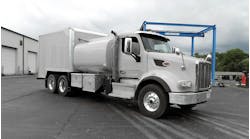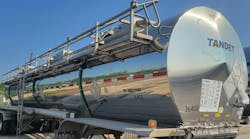As he made his way along the notoriously dangerous Ingraham Trail that connects Yellowknife to the now-famous diamond mine “Ice Road” in Canada's Northwest Territories, Allen Scraba, owner of ARS Trucking & Welding, explained that he has been delivering diesel fuel via the frigid passageway for 20 years.
“I've been coming up here for quite some time now, and I really enjoy it. In fact, today (February 12, 2008) is a beautiful day. It's pretty warm…-37 degrees (-35°F),” he joked. “Every day is a new experience and you need to be ready for anything in this environment.”
Built and maintained by a joint venture of diamond mining companies operating in this remote location for more than 20 years, the Contwoyto ice road is the main supply artery, though it is only open two months out of the year. The road crosses many lakes wherever possible to save costs and, of the 350-kilometer length to the Diavik mine, 75% is on ice, according to Diavik Diamond Mines Inc.
Materials such as diesel fuel, construction equipment, explosives, and cement are needed to operate a diamond mine. Scraba and the rest of the ARS trucking team do their part by transporting millions of gallons of diesel fuel to the Diavik diamond mine (a 36-hour round trip) each year. Nearly half of the trucks on the ice road haul fuel, according to Scraba.
ARS Trucking & Welding, Ltd (which is based in Edmonton, Alberta), along with ECL Group of Companies Ltd, Calgary, Alberta, had a 2008 contract with Diavik to supply approximately 60 million liters (15.8 million gallons) of diesel fuel during this two-month window. However, the ice road that holds these rolling tankers fluctuates in thickness, so the winter road service company — Nuna Logistics Ltd — issues weight restrictions on a periodic basis.
“Today, the ice is 38 inches thick so we can haul up to 124,560 pounds on a B-Train and 126,000 on a Super B-Train (eight total axles),” Scraba said. “We're having a very good year so far. We've made several trips and will hit our target early if this weather and temperature keep up. It takes roughly 36 hours round trip to deliver to Diavik. We had a rough year in 2006 and Diavik had to fly in many loads of fuel, which is very costly. In fact, it takes more fuel to fly round trip than they actually receive.”
Scraba went on to explain that if, in fact, the weather does not cooperate with them and enough fuel does not reach the Diavik tank farm, the diamond mine company can still transport the needed diesel fuel to the site — by airplane.
“If they are desperate enough, they will fly fuel in via ‘Herc’ (C-130 Hercules aircraft),” he said. “The only problem is that it takes about 30,000 liters of fuel to fly the Herc roundtrip, and they only receive 22,000 liters of fuel for the mine. Not very economical but sometimes it's the only option. The mine has to pay for the fuel to operate the plane, the fuel they are receiving, and the operators' time. It makes truck deliveries look very cost-effective, but it all depends on Mother Nature.”
Rough roads
As he continued toward the ice road over the Ingraham Trail, Scraba stopped and pointed out the hill and exact location where one of his drivers rolled a tanker truck onto its side during the 2007 season. The incident was included on an episode entitled “Midseason Mayhem” that was part of the television series Ice Road Truckers, a show that debuted last year on the History Channel.
“As our driver came around the corner, his back wheel caught on the side of the slick road and the truck landed on its side,” Scraba explained. “We came out with an empty tanker and used our Blackmer pump to transfer the fuel. I wouldn't trust any other pump on our trucks other than Blackmer. When you're out here in temperatures that reach minus 60 degrees and lower, you need a pump that you can depend on and that's Blackmer.”
The extreme temperatures can wreak havoc on the numerous components and parts on a tractor and trailer. Frozen air and brake lines are the most common occurrence, and drivers constantly have to perform preventive maintenance on everything in order to keep hauling over the ice road. In addition, product-handling equipment used on the rigs can freeze up and provide no use when called upon.
Drivers are supported by a skilled ARS maintenance team working out of a two-bay shop that is big enough to accommodate Canadian B-trains. The shop is at ARS's newly acquired staging area in Yellowknife. The facility connects to the RTL Robinson Enterprises Ltd tank farm, where diesel shipments over the ice road begin. ARS also has a welding and truck repair shop in Edmonton.
Proven equipment
Along with an aggressive maintenance effort, ARS starts with rugged vehicles outfitted with components that have proven their reliability in the frozen north. For instance, the fleet runs Kenworth tractors with Blackmer product pumps.
“I've used Blackmers for my entire career and wouldn't use any other pump,” Scraba said. “They are the most durable piece of equipment on my trucks. When called upon, the Blackmers perform and provide our fleet with reliable operation and great flow rates. I can't remember a time when our pumps haven't been able to operate due to the cold weather or harsh operating conditions.”
ARS has standardized with Blackmer pumps on company-owned trucks, and Scraba encourages all of his contract drivers to do the same. He also has tried to show the benefits of Blackmer's sliding vane pumps to the operations employees at the Diavik diamond mine.
“The unloading area at the Diavik mine has six-inch centrifugal pumps we have to use to unload every time. Those pumps are constantly losing prime and causing backups for our drivers,” Scraba said. “I have not had problems like that with my three-inch TX Blackmer pumps during my 20 years up here. In fact, I'm going to conduct a side-by-side comparison with their centrifugals near the end of the ice road season to show them how much better the Blackmers perform.”
ARS has been working with Blackmer distributor Drive Products, Edmonton, for many years. “We work with our distributor very closely and appreciate their level of experience in this industry,” Scraba said. “They provide us with great service and we look at them as a partner for our business.”
The 2008 season was very good for the drivers on the ice road. The ice stayed thick and hospitable for the hundreds of drivers crossing the treacherous terrain every day. For Scraba and ARS, the season was a complete success, and all of the diesel fuel was delivered to the Diavik diamond mine as planned.
“We had a great year and we certainly hit all of our goals for our customer,” Scraba said. “The most important part of this job is delivering on your promises. Sure, we've had our hiccups throughout this season. We always do.
“Temperature and conditions are very demanding, and when issues present themselves we have to deal with them quickly and correctly. However, every good driver and fleet owner knows that with the right equipment and proper planning, you are in a better position to succeed. That's why we rely on certain equipment for our jobs.”
Scraba took to the ice road for yet another trip, but he was not hauling diesel on this run. Instead, his tractor was pulling a flatbed trailer with a tractor strapped down on the deck. During the day, Scraba received word that one of his rigs broke down near the Diavik mine, so he was making the roughly 36-hour roundtrip to the mine and back to drop off the operational power unit and pick up the sidelined tractor.
As he rolled onto the ice road, unnerving cracks and pops from the ice underneath his weight can be heard several feet away. These cracks and pops are a constant reminder to all of the drivers that they aren't making the typical fuel delivery. Instead they are making their living on ice.
Darren Wight is a freelance writer for Blackmer, Grand Rapids, Michigan.
Related article: Equipped for any emergency.








